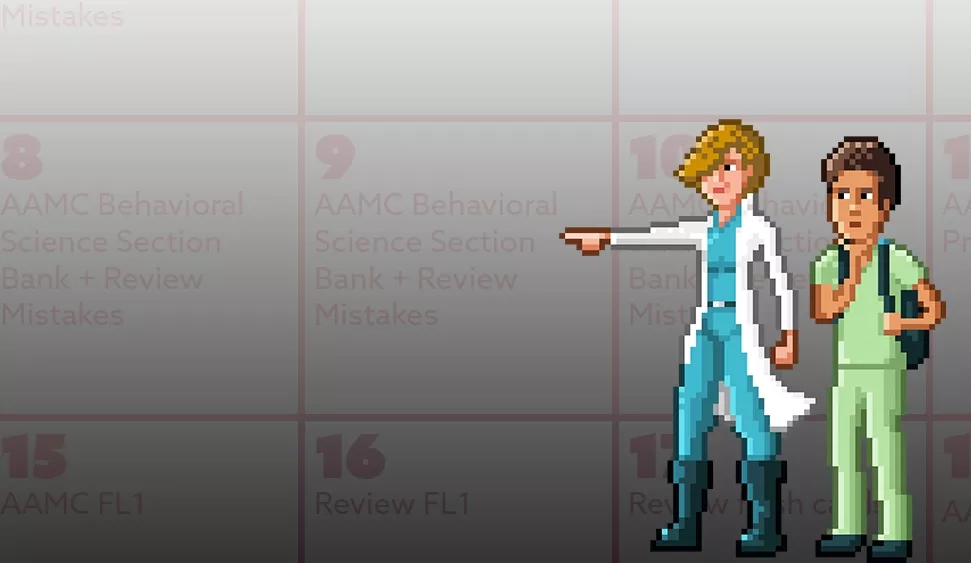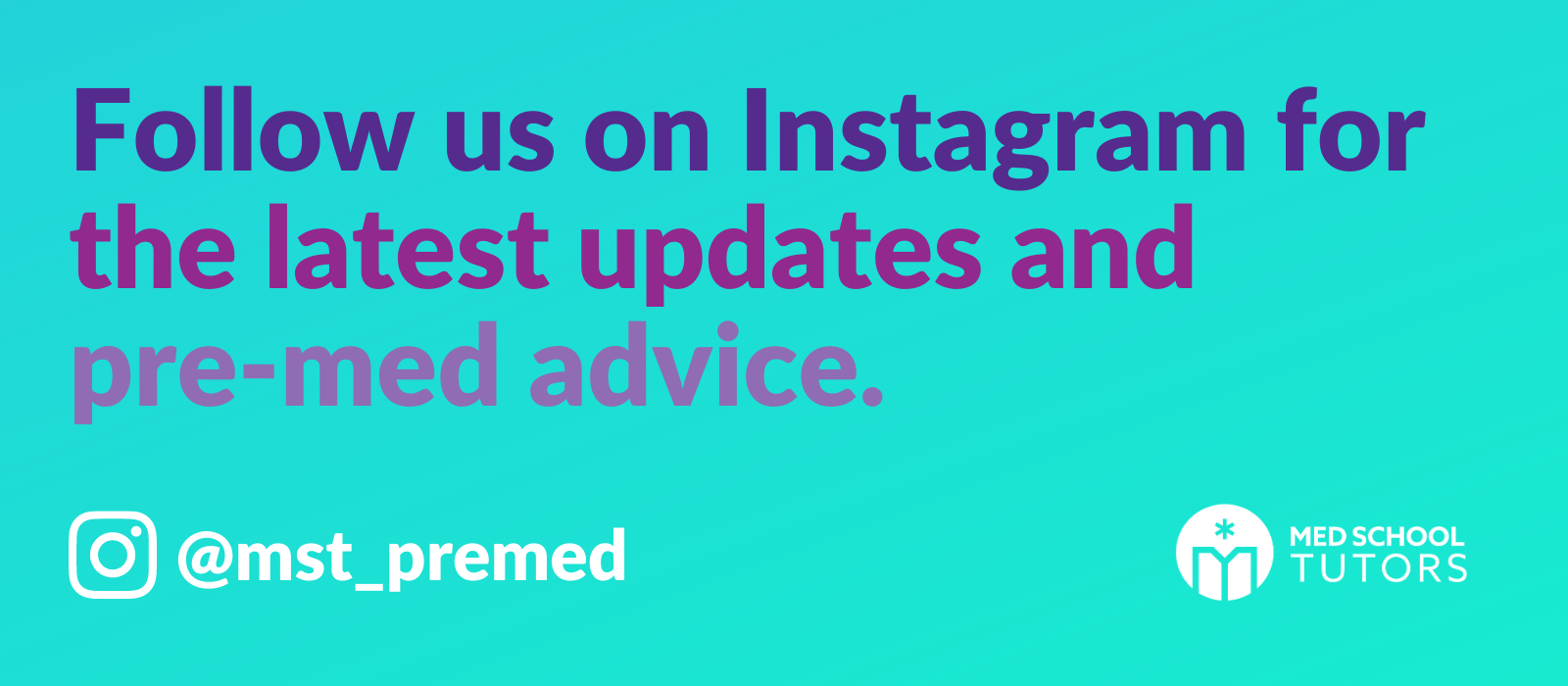Kevin Wang contributed to this post.
We have several new MCAT study resources available to help you get started with MCAT prep! If you’re just beginning to study for the MCAT — or aren’t quite sure when to get started — you’ve come to the right place!
When Should I Start Studying for the MCAT?
You’ll want to start studying three to six months before your MCAT exam.
And if you aren’t sure when you should take the MCAT, have a look at our “How to Decide When to Take the MCAT” blog post.
To help you get a sense of what your MCAT study schedule should look like, we created a series of free MCAT study guides and a “30 Days to MCAT Test Day” sample schedule.
MCAT Study Guide PDFs
Download your free MCAT study guides! There is one study guide for each section of the MCAT:
- Chemical and Physical Foundations of Biological Systems
The chemical and physical foundations of biological systems is the first section on the MCAT. This section will ask you questions about the physical, mechanical, and biochemical functions of human tissues, organ systems, and organs. You can expect questions that test concepts from biology, organic chemistry, inorganic chemistry, physics, and molecular biology. - Critical Analysis and Reasoning Skills (CARS)
The critical analysis and reasoning skills (CARS) is the second section on the MCAT. This section will ask you comprehension questions in response to passages that you read. You can expect passages from a wide variety of sources and styles, including complex conversational passages. You may also be asked to examine different theories or the author’s meaning or tone. - Biological and Biochemical Foundations of Living Systems
The biological and biochemical foundations of living systems is the third section on the MCAT. This section will ask you questions about processes for living organisms. You can expect questions that test concepts from biology, biochemistry, organic chemistry, and inorganic chemistry. - Psychological, Social, and Biological Foundations of Behavior
The psychological, social, and biological foundations of behavior is the fourth section on the MCAT. This section will ask you questions about how psychological, biological, and social factors impact behavior, culture, society, and people’s well-being. It is also the section that tests most on discrete knowledge. You can expect questions that test concepts from psychology, sociology, and biology.
Each of these MCAT study guides includes:
- Recommended undergraduate courses to take in preparation for the exam
- MCAT prep timeline
- A section and scoring overview
- Recommended study resources
- Must-know exam topics
One-Month MCAT Study Schedule: What It Is and How to Use It
Our “30 days to MCAT” study schedule is not a full study schedule, which is why is doesn’t include any content review. This should make sense, because 30 days is never enough to study for the MCAT!
- This schedule assumes that you have already been doing MCAT prep for one to two months and provides an outline for a good way to spend your last 30 days. You have finished your content review, and now all you have left to do is practice. It also assumes that you have made flash cards or are using a pre-made deck from some source in order to rehearse and review your content.
- Our study schedule primarily uses the materials found on the AAMC website. This is widely considered to be the most high-yield practice out there, since it is all written by the same people who write the MCAT. All of the AAMC’s online MCAT material can be purchased for $268.
- When using this 30-day schedule, we don’t expect you to follow it to the letter. Adapt it to fit your own needs. If you feel like you are very strong in physics, you might not need to complete the question packs. If you think you have more time one day, do more than just two sections of practice. If you think you’re very weak in CARS, then fit in a few passages of CARS every day you’re not taking a FL exam. This schedule is meant to be a guide, not strict instructions.
- On every seventh day in our study schedule, we have a tutoring session/break day. If you do not have a private tutor, keep this day as a break day, but try to get some sort of review in. Maybe do a few CARS passages or look over your formulas. Even if it is only for one to two hours, it’s important to stay in the MCAT mindset so you are as prepared as possible on test day. The goal of all this practice is to make you think on test day, “This is no big deal, I have been doing this every day for the last month. It’s nothing scary, it’s just another day!”
While at first glance the study schedule might seem arbitrary, there is a reason it is structured the way that it is. In the first six days, you complete the “AAMC MCAT Official Prep Online Practice Questions” and all of the Question Packs. The former is simply a half-length MCAT exam — this will serve as a good introduction to the MCAT format and style. The Question Packs are early because these are generally more content heavy. The questions in the Question Packs will test how well you know the material of the MCAT more than your critical thinking ability.
Next are the Science Section Banks. These are generally much more difficult than the Question Packs and will really test your ability to apply what you know and put it all together. These questions will look much more like questions you’ll see on test day.
After this, your last two-and-a-half weeks will be spent in a cycle of completing an AAMC full-length exam, reviewing your mistakes, and completing sections in your weakest area. If you don’t have a set of practice tests from another test company, just try to find practice online and spend two to three hours doing practice.
Finally, after taking all of the AAMC FL exams, you need to decide if you’re happy with your scores. Since these scores are the only way to predict how you will do on your actual exam, if you think they’re too low, reschedule your exam.
Typically, people score within three points of their practice exam average on their actual exam. By this point, you won’t be able to get a refund, but a wasted $315 (the cost of registering for the MCAT) is definitely worth it if the alternative is retaking the MCAT, in which case you would still have to spend $315 and you’ll have a low MCAT score on your application, which is seen pretty negatively by medical school admissions committees.






